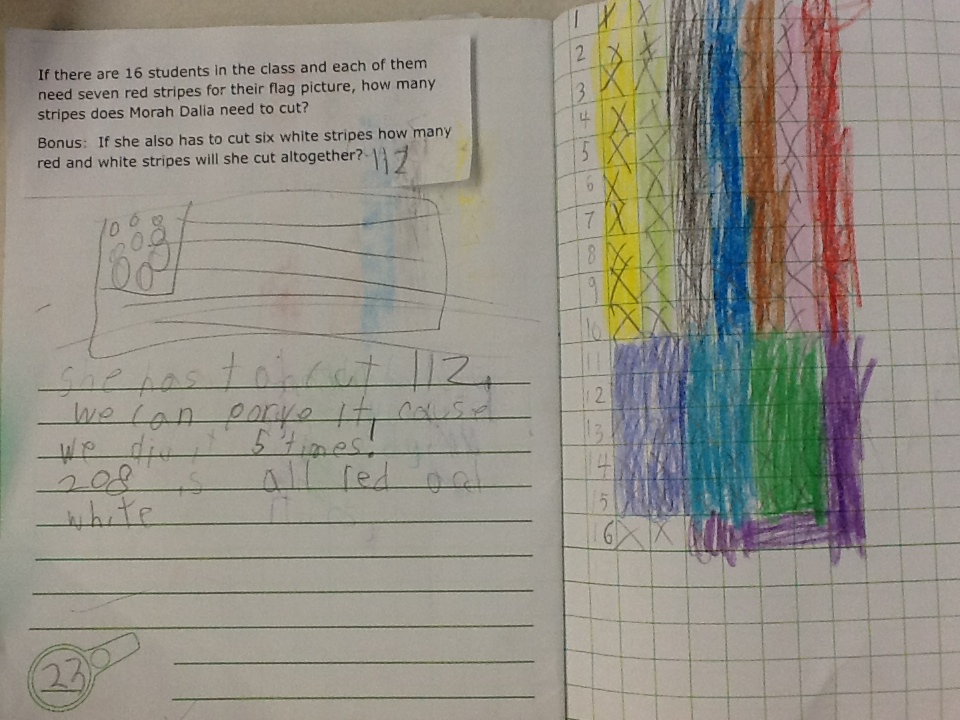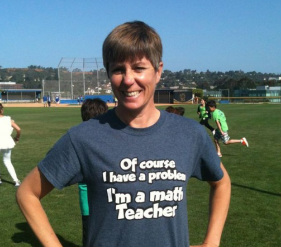Are you cringing already? I know, many adults say they "aren't math people." But you are wrong. You might not be fast at your reasoning and calculating, but that doesn't mean you can solve mathematical problems logically. Really, anyone can do it. My first graders are proof. What was this problem they worked on for so long you wonder. Well, here's the best part, some of the kiddos needed more time the next day in order to finish. Whaaaatt? Yes, my little kiddos were figuring out how many stripes we needed in order for every student in the class to make an American flag. How man red stripes, how many white, and how many in total. Yes, first graders were working on this problem. I figure if they can add 7+7 to figure out how many stripes on two flags, why not three, or seven, or sixteen? And they did it! Even better, they did it with a sense of excitement and enthusiasm.
Some used blocks, made piles, rearranged them into groups of tens and counted. Some drew arrays of squares, colored in groups of ten and counted that way. Some used multiplication to figure out the number of red stripes, then subtracted sixteen to find the number of white stripes. And here's the kicker... I refused to check their answers. I'm training these kids to be mathematicians, not to fill out a worksheet. How often in your adult life do you fill out worksheets? This means the kiddos have to find an answer, and solve the problem in at least one more way where they will hopefully get the same answer. Then they need to check their work against that of fellow mathematicians (classmates) to see if the results can be replicated. This is how mathematicians work in the real world, so this is how the mathematicians in my class work. We call this comparing of strategies and answers Math Conferences. I go to teacher math conferences to learn from and teach other teachers, so my students go to student math conferences to learn from and teach other students.
Now this work ethic didn't magically implant itself in the brains of my students, we trained for this. We do work on daily math lessons with instruction and practice, and we start the year with simple math problems. But just like training for a marathon, you build strength and stamina until you are a finely trained athlete. The same is true for becoming a mathematician. All it takes is training, practice, and perseverance. Working persistently, and for great lengths of time, in order to solve something that needs to be solved is a skill that will serve these children well in their lives. Careers, relationships, life traumas and emergencies... all of these require hard work, not giving up, and finding that solution that works. So, I hope that my little mathematicians, unlike most Americans, will retain and foster these skills, and grow up to say, "I AM a math person."
Some used blocks, made piles, rearranged them into groups of tens and counted. Some drew arrays of squares, colored in groups of ten and counted that way. Some used multiplication to figure out the number of red stripes, then subtracted sixteen to find the number of white stripes. And here's the kicker... I refused to check their answers. I'm training these kids to be mathematicians, not to fill out a worksheet. How often in your adult life do you fill out worksheets? This means the kiddos have to find an answer, and solve the problem in at least one more way where they will hopefully get the same answer. Then they need to check their work against that of fellow mathematicians (classmates) to see if the results can be replicated. This is how mathematicians work in the real world, so this is how the mathematicians in my class work. We call this comparing of strategies and answers Math Conferences. I go to teacher math conferences to learn from and teach other teachers, so my students go to student math conferences to learn from and teach other students.
Now this work ethic didn't magically implant itself in the brains of my students, we trained for this. We do work on daily math lessons with instruction and practice, and we start the year with simple math problems. But just like training for a marathon, you build strength and stamina until you are a finely trained athlete. The same is true for becoming a mathematician. All it takes is training, practice, and perseverance. Working persistently, and for great lengths of time, in order to solve something that needs to be solved is a skill that will serve these children well in their lives. Careers, relationships, life traumas and emergencies... all of these require hard work, not giving up, and finding that solution that works. So, I hope that my little mathematicians, unlike most Americans, will retain and foster these skills, and grow up to say, "I AM a math person."


 RSS Feed
RSS Feed
